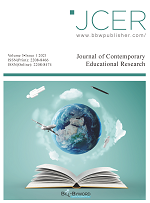Abstract
Language awareness refers to the consciousness of what language is and how language works. The process of establishing or developing language awareness should be a discovery of language use by learners themselves, maybe under the guidance of teachers. In this way, language awareness is considered not only as a linguistic term, but also a pedagogical approach. Just like society, change is also constant in the world of language. This paper aims to provide a reflection on language awareness from the angle of vocabulary variations and changes.
References
Bolitho R, Carter R, Hughes R, et al., 2003, Ten Questions About Language Awareness. ELT Journal, 57(3): 251-259.
Arndt V, Harvey P, Nuttall J, 2000, Alive to Language, Cambridge University Press, Cambridge.
Carter R, 2003, Language Awareness. ELT Journal, 57(1): 64-65.
Hawkins E, 1984, Awareness of Language: An Introduction. Cambridge University Press, Cambridge.
Tomlinson B, 1994, “Pragmatic awareness activities.” Language Awareness. 3(3): 119-129.
Bolitho R, Tomlinson B, 1995, Discover English, New Edition, Heinemann, Oxford.
Van LL, Carter R, Nunan D, 2001, “Language Awareness,” The Cambridge Guide to Teaching English to Speakers of Other Languages, Cambridge University Press, Cambridge: 160-165
Crystal D, 1987, The Cambridge Encyclopedia of Language, Cambridge University Press, Cambridge.
Yule G, 1996, The Study of Language, Cambridge University Press, Cambridge.
Andrews L, 2006, Language Exploration and Awareness. Lawrence Erlbaum, Mahwah, NJ.
